

E-Books → Democracy for Sale Elections, Clientelism, and the State in Indonesia
Published by: voska89 on 20-03-2024, 21:35 |  0
0
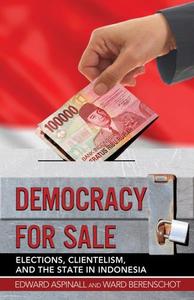
Free Download Democracy for Sale: Elections, Clientelism, and the State in Indonesia By Edward Aspinall, Ward Berenschot
2019 | 316 Pages | ISBN: 1501732978 | PDF | 3 MB
Democracy for Sale is an on-the-ground account of Indonesian democracy, analyzing its election campaigns and behind-the-scenes machinations. Edward Aspinall and Ward Berenschot assess the informal networks and political strategies that shape access to power and privilege in the messy political environment of contemporary Indonesia.In post-Suharto Indonesian politics the exchange of patronage for political support is commonplace. Clientelism, argue the authors, saturates the political system, and in Democracy for Sale they reveal the everyday practices of vote buying, influence peddling, manipulating government programs, and skimming money from government projects. In doing so, Aspinall and Berenschot advance three major arguments. The first argument points toward the role of religion, kinship, and other identities in Indonesian clientelism. The second explains how and why Indonesia's distinctive system of free-wheeling clientelism came into being. And the third argument addresses variation in the patterns and intensity of clientelism. Through these arguments and with comparative leverage from political practices in India and Argentina, Democracy for Sale provides compelling evidence of the importance of informal networks and relationships rather than formal parties and institutions in contemporary Indonesia.
E-Books → By–elections in British Politics, 1832–1914
Published by: voska89 on 20-03-2024, 21:12 |  0
0
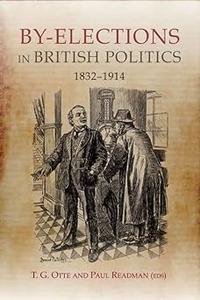
Free Download T.G. Otte, "By-elections in British Politics, 1832-1914"
English | ISBN: 1843837803 | 2013 | 320 pages | PDF | 5 MB
Explores the many issues surrounding by-elections in the period which saw the extension of the franchise, the introduction of the ballot, and the demise of most dual member constituencies.
E-Books → Counting Islam Religion, Class, and Elections in Egypt (Chapter 1 only)
Published by: voska89 on 18-03-2024, 00:36 |  0
0

Free Download Counting Islam: Religion, Class, and Elections in Egypt (Chapter 1 only) By Tarek Masoud
2014 | 276 Pages | ISBN: 0521279119 | PDF | 2 MB
Why does Islam seem to dominate Egyptian politics, especially when the country's endemic poverty and deep economic inequality would seem to render it promising terrain for a politics of radical redistribution rather than one of religious conservativism? This book argues that the answer lies not in the political unsophistication of voters, the subordination of economic interests to spiritual ones, or the ineptitude of secular and leftist politicians, but in organizational and social factors that shape the opportunities of parties in authoritarian and democratizing systems to reach potential voters. Tracing the performance of Islamists and their rivals in Egyptian elections over the course of almost forty years, this book not only explains why Islamists win elections, but illuminates the possibilities for the emergence in Egypt of the kind of political pluralism that is at the heart of what we expect from democracy.
E-Books → Abraham Ibn Ezra Latinus on Elections and Interrogations
Published by: voska89 on 17-03-2024, 18:17 |  0
0

Free Download Abraham Ibn Ezra Latinus on Elections and Interrogations: A Parallel Latin-English Critical Edition of Liber Electionum, Liber Interrogationum, and Tractatus Particulares. Abraham Ibn Ezra's Astrological Writings, Volume 7
by Shlomo Sela
English | 2020 | ISBN: 9004431438 | 656 Pages | True PDF | 2.66 MB
E-Books → Presidential Elections and Majority Rule [Audiobook]
Published by: voska89 on 7-03-2024, 20:18 |  0
0
![Presidential Elections and Majority Rule [Audiobook] Presidential Elections and Majority Rule [Audiobook]](https://i123.fastpic.org/big/2024/0307/df/5a1d2e70487fe5a77b5588ccd26dbfdf.jpeg)
Free Download Presidential Elections and Majority Rule: The Rise, Demise, and Potential Restoration of the Jeffersonian Electoral College (Audiobook)
English | April 21, 2020 | ASIN: B086VR19VQ | M4B@128 kbps | 7h 28m | 407 MB
Author: Edward B. Foley | Narrator: Rick Adamson
The Electoral College that governs America has been with us since 1804, when Thomas Jefferson's supporters redesigned it for his re-election. The Jeffersonians were motivated by the principle of majority rule. Gone were the days when a president would be elected by acclamation, as George Washington had been. Instead, given the emergence of intense two-party competition, the Jeffersonians wanted to make sure that the Electoral College awarded the presidency to the candidate of the majority, rather than minority, party. They also envisioned that a candidate would win by amassing a majority of Electoral College votes secured from states where the candidate's party was in the majority.
E-Books → American Political Parties and Elections A Very Short Introduction (Very Short Introductions)
Published by: voska89 on 25-03-2023, 00:36 |  0
0
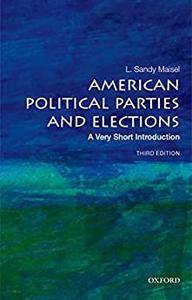
Free Download American Political Parties and Elections: A Very Short Introduction (Very Short Introductions) by L. Sandy Maisel
English | July 14, 2022 | ISBN: 0197605117 | 202 pages | PDF | 2.46 Mb
Few Americans and even fewer citizens of other nations understand the electoral process in the United States. Still fewer understand the role played by political parties in the electoral process or the ironies within the system. Participation in elections in the United States is much lower than in the vast majority of mature democracies. Perhaps this is because of the lack of competition in a country where only two parties have a true chance of winning, despite the fact that a large number of citizens claim allegiance to neither and think badly of both. Or perhaps it is because in the U.S. campaign contributions disproportionately favor incumbents in most legislative elections, or that largely unregulated groups such as the now notorious 527 organizations have as much impact on the outcome of a campaign as do the parties or the candidates' campaigns. For instance, in two of the last six presidential elections, the winner of the popular vote lost the election in the Electoral
E-Books → Routledge Handbook on Elections in the Middle East and North Africa
Published by: voska89 on 26-02-2023, 15:50 |  0
0
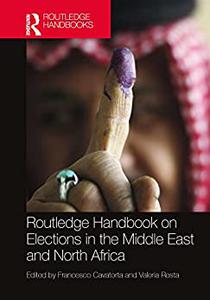
Routledge Handbook on Elections in the Middle East and North Africa
English | 2023 | ISBN: 1032028742 | 461 Pages | PDF (True) | 51 MB
Structured around five main themes, contributors provide chapters detailing how their case studies illustrate specific themes within individual country settings. Authors disentangle the various aspects informing elections as a process in the Middle East by taking into account the different contexts where the electoral contest occurs and placing these into a broader comparative context. The findings from this Handbook connect with global electoral developments, empirically demonstrating that there is very little that is "exceptional" about the Middle East and North Africa when it comes to electoral contests.
E-Books → By-Elections In British Politics
Published by: voska89 on 22-02-2023, 21:27 |  0
0

Dr Chris Cook, John Ramsden, "By-Elections In British Politics"
English | 1997 | pages: 346 | ISBN: 1857285352 | PDF | 7,6 mb
E-Books → The 2014 European Parliament Elections in Southern Europe Still Second Order or Critical Contests
Published by: voska89 on 19-02-2023, 03:37 |  0
0
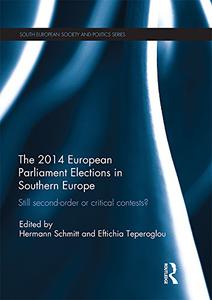
Hermann Schmitt, Eftichia Teperoglou, "The 2014 European Parliament Elections in Southern Europe: Still Second Order or Critical Contests?"
English | 2016 | ISBN: 1138656895, 113839310X | PDF | pages: 176 | 3.1 mb
Southern Europe has been the EU region most exposed to the Eurozone sovereign debt crisis with consequences for national party systems and political stability. The 2014 European Parliament elections took place at a crucial time for Europe and Southern European societies more generally. This book analyses the Euroelections in Southern Europe, asking whether these followed the usual pattern of low-stimulus contests or whether the crisis context raised the bar. Country chapters on Italy, Greece, Spain, Portugal, Cyprus and Malta investigate the background of the elections, the electoral campaign and the rise of Euroscepticism. The linkage between governments' economic performance, the Europhile or Eurosceptic stances of political parties, and their electoral performance are at the core of the analysis in each chapter. The findings reveal that the political and electoral consequences of the economic crisis have not fundamentally challenged the second-order character of the 2014 European Parliament elections in Southern Europe. However, electoral behaviour exhibits some indications of a more critical contest in which the EU divide becomes more significant and polarising in determining voting choices. This book was previously published as a special issue of South European Society and Politics.
E-Books → Protest Elections and Challenger Parties
Published by: voska89 on 19-02-2023, 02:58 |  0
0
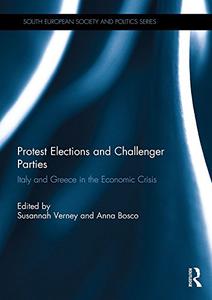
Susannah Verney, Anna Bosco, "Protest Elections and Challenger Parties"
English | 2014 | ISBN: 0367738953, 1138813605 | PDF | pages: 187 | 2.9 mb
Both in Greece in 2012 and Italy in 2013, it took two elections to form a government. A repeat parliamentary contest was required in Greece and the unprecedented re-election of the outgoing President of the Republic in Italy before a cabinet could be formed. Against a background of economic crisis and national austerity, both countries experienced 'protest elections' in which the overriding concern for an unusually large proportion of voters was not to choose a government but to express dissent. The outcome included record-breaking electoral volatility, the decline of bipolarism, the startling rise of challenger parties and the transformation of national patterns of government formation, including experiments with grand coalitions and technocrat-led cabinets. These developments sent shock waves through Europe and beyond, suggesting Southern Europe might be drifting towards ungovernability.



